Saigon, Hanoi and DaLong Bay
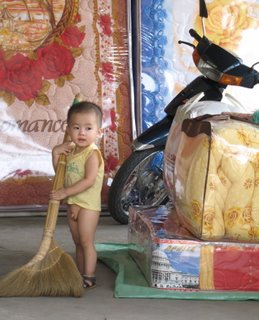
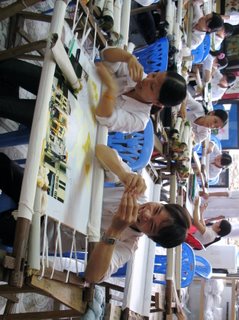
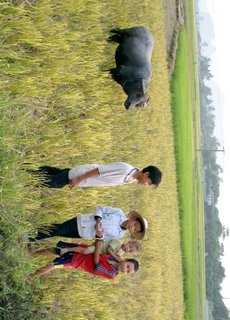
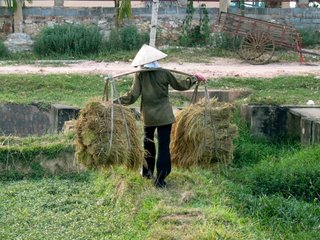
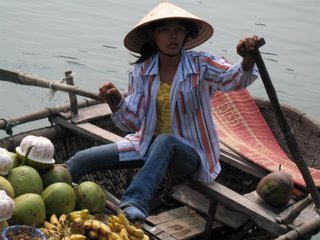

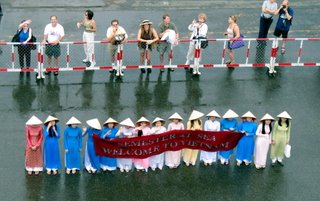
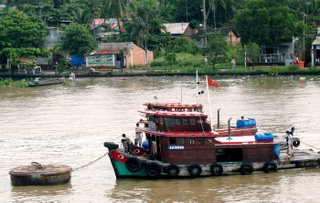
For most of us, Vietnam has been an emotional leap into the past and its troubled present. Everywhere signs of struggle stare us in the face, especially omnipresent vendors' urgency to sell goods on the streets and in the several markets we visited, as well as the visits to war remembrance/remnants museums and the Ho Chi Minh masoleum. I think we still loved our five days in Vietnam because we were rooting for the country, coming out of 1000 years of war and foreign rule. Now, under Communism, the country has a new vibrancy, a vigor we saw in China thirty years ago, and a pace that wore us out. After a long sail down the Saigon River, we ported not far from Saigon city center. With a city tour our first day, we arose at 3:30 am for a 5 am flight to Hanoi on our second. I'll add some jpegs that give a flavor of the excitement.
Vietnam is a Communist country. That said, the culture is still very open and free. Open and organized criticism of the gov, of the widespread corruption, is forbidden and dangerous. But the net is mostly uncensored, the media very open to talking about various forms of urgan and rural decay (poor or non existent health care, densest housing in Asia, practically no sewage control, etc) and corruption.
The US consulate’s American Citizen Service Chief visited the ship before we embarked and said that Saigon is a “hustle and bustle city,” with at least an 8% economic growth annually over the past 15 years. Robert Templar’s stunning profile of Vietnam, Shadows and Wind, reinforces that picture while still examining the high human costs of the “American War” (which is what most Vietnamese call it), the French and Chinese occupations. I’d urge anyone interested in Vietnam to read it. In 1986 market reforms were instituted based on the China model; this turned around a long recession. Now Vietnam is a growing economic force, with 80 million people and the world’s second largest rice exports.
(This is Dianne's part) Our city tour guide, Sa, told us about the city of Saigon. He said workers were paid more than others in Viet Nam but that was still only about $3000 and even small houses cost about $300,000. So most houses had shops on the first floor and the families lived above—extended families of grandparents, their children and wives/husbands and all the grandchildren as well. Everywhere in Viet Nam, the guides emphasized how old people were respected—(of course, the life expectancy is only 64). And the people here are brutally honest—when one of the female faculty members went to a tailor to get a traditional Vietnamese dress made( a sleeveless long dress with slits up both sides worn over pants), the women in the shop told her not to get one—that she was an old lady (of 45 perhaps!) and that her butt was too big—that the dress wouldn’t look good on her. Sa also explained why there is always the wild traffic, a stream of motorbikes that seem always without end—there are over 4, 000,000 motorbikes in the city since few people can afford cars. The pollution is pretty bad as you can imagine. Sa whose father fought for the South Vietnamese said he was “happy with the current system because democracy without education is suicide.”
I/Tom had a rather quick ten minute exchange in Saigon near the tail end of our city tour on our first day in port. I was moving toward the bus when a man about my age stopped me in the street to talk. He told me his father had been killed in the war, that he didn’t hold it against us, that in fact he loved Americans. He was in marketing and gave me his business card, urging me to email him. This was a most pleasant exchange for me, and typical of many we heard about, in contrast to the many on the street and in markets where Westerners learn not to look at the pleading merchants, often small and unwashed children, who touch us on the shoulders and arms, beckoning us to buy.
US diplomatic relations were reestablished in 1995 under Clinton, and we currently support Vietnam’s entry into the World Trade Association. Big topic of conversation here: Bush’s visit in November to Hanoi, for the Asia Pacific Economic Conference. Another big issue for us: agent orange compensation. This was emotionally brought home when Dianne and I visited a textile factory outside Hanoi where at least 200 Vietnamese of all ages and handicapped in various forms were stitching embroidered art works, on sale, some $30, others $200-300. Dianne and I bought two. How could we not?
(Dianne says) We enjoyed the city of Hanoi, flying there from Saigon took about two hours (and we almost didn’t get flight back to the ship because of another typhoon which we heard was a disaster in the Phillipines and also in the central section of Viet Nam), We enjoyed the bus ride into the country and seeing the “thousand colors of green” of the Viet rice paddies and the land worked by water buffaloes—many wandering loose in the fields and even across the roads to “fertilize” the rice fields. The picture of women in conical hats in the fields and carrying heavy loads balanced in two baskets handing from a yoke on their shoulders is a true one of the countryside.
The architecture in the north was charming—If one doesn't note the entire lack of city planning and the absence of open spaces, functioning sewer systems, etc) It is influenced by the French—the narrow houses looked almost like very small, narrow Italian villas—about 3-4 stories high, with island shutters and yellow or pink or green or turquoise stucco fronts while the sides were left a gray cement hue. Our very good guide, Kien, joked that there were only four good things that Vietnam got from the French: architecture, the railroad, French bread, and the pepper and rubber and coffee trees they introduced when they colonized the country. (More to come)

2 Comments:
T & D: interesting comments about Vietnam. It is fascinating to me that the communist rule has allowed the economy to develop. Must have been a bittersweet visit. I took a quick walk around your property yesterday. All is well. In fact, it appears that the wildlife is adjusting to not having Haley around. I came across a very relaxed woodchuck down by the foot bridge who seemed very surprised that his Sunday afternoon nap was interrupted. I’ll post some pic’s on Docent’s on course tonight. – Cheers - CB
By the way..great photography. CB
Post a Comment
<< Home